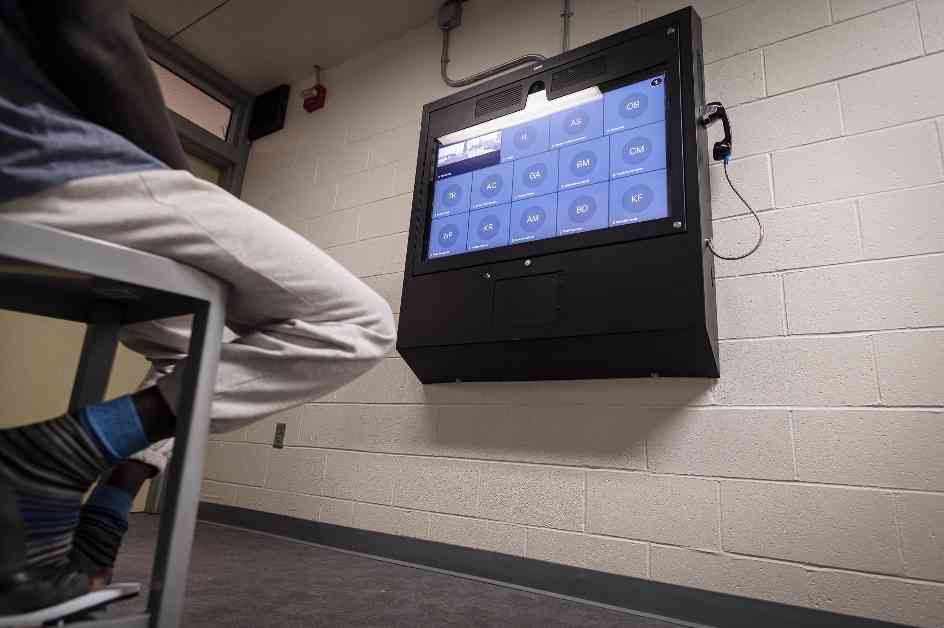In a recent joint hearing of the House Corrections and House Judiciary committees, Vermont’s corrections commissioner, Nick Deml, raised concerns about the impact of remote court hearings on the separation of powers. He highlighted the existing virtual courthouses operating within Vermont’s six prisons as a significant breach in the system. Deml’s fiery testimony called attention to the challenges faced by incarcerated defendants who often rely on prison caseworkers to navigate their legal proceedings due to limited contact with their defense counsel.
Since the onset of the Covid-19 pandemic, remote court hearings have become a common practice, raising questions about the efficiency and fairness of the judicial process. Deml emphasized that these virtual proceedings contribute to a backlog of court cases as they lack the expedience and effectiveness of in-person hearings. He suggested that what could be resolved in a single court date in person may require two sessions remotely, further complicating the legal process for defendants.
To address these issues, Deml proposed bringing court staff into prisons to handle remote proceedings or increasing the number of transportation deputies to reduce reliance on virtual hearings. Currently, state-funded sheriff’s deputies manage transportation responsibilities, with a shortage of deputies leading to postponed hearings and delayed case resolutions. The Department of State’s Attorneys and Sheriffs is seeking additional deputies to alleviate the strain on the transportation system, but budget constraints may hinder their efforts.
The potential impact of a shortage of transport deputies on court proceedings prompted House Judiciary Committee chair Rep. Martin LaLonde to inquire about the consequences of reducing the number of deputies available for transportation. This discussion underscored the critical role that transportation deputies play in ensuring timely and efficient court hearings, highlighting the need for adequate resources to support the judicial process.
Moving forward, addressing the challenges posed by remote court hearings will require a collaborative effort among various stakeholders, including corrections officials, court administrators, and law enforcement agencies. By prioritizing the needs of incarcerated defendants and streamlining the legal process, Vermont can work towards a more equitable and effective judicial system.
### University of Vermont Attains R1 Research Status
In a separate development, the University of Vermont announced its achievement of R1 institution status, a prestigious designation recognizing institutions with significant research spending and doctoral production. Despite uncertainties surrounding federal research funding, particularly in light of attempts by the Trump administration to pause funding through agencies like the National Institutes of Health, UVM remains committed to advancing research initiatives.
The Larner College of Medicine at UVM has secured over $100 million in research grants, with a substantial portion coming from the National Institutes of Health. Dean Richard Page highlighted the university’s dedication to research excellence and its resilience in the face of potential funding disruptions. Vice President Kirk Dombrowski emphasized the university’s continued momentum in research activities, underscoring a commitment to maintaining research endeavors despite external challenges.
As UVM celebrates its newfound R1 status, the university’s research community looks towards a future of continued innovation and discovery, leveraging its new designation to further enhance its research capabilities and academic reputation.
### Gov. Phil Scott Signs Municipal Electorate Bill into Law
On a legislative front, Governor Phil Scott signed the first bill of the new legislative biennium, H. 78, into law. This bill allows municipalities to elect “any or all” officials by Australian ballot, streamlining the electoral process for local officials. The swift action taken by Governor Scott reflects a commitment to enhancing democratic practices and ensuring efficient governance at the local level.
Looking ahead, the implementation of this new law will provide municipalities with greater flexibility in conducting elections, offering voters increased opportunities to participate in the electoral process. As Town Meeting Day approaches next month, the impact of this legislation will be felt across Vermont, setting a precedent for future electoral reforms and administrative improvements at the local level.
### Gov. Phil Scott Engages in Light-hearted Banter with Connecticut Governor
In a lighthearted exchange on social media, Governor Phil Scott joined Connecticut Governor Ned Lamont in a playful interaction, poking fun at New York Governor Kathy Hochul. Drawing inspiration from President Donald Trump’s executive order attempting to rename the Gulf of Mexico, Lamont humorously proposed renaming a water body between Connecticut and Long Island as the “Connecticut Sound.” Scott, in good spirits, responded by claiming a river flowing into the contested water body for the state of Vermont, adding a touch of humor to the online exchange.
The jovial banter between the governors serves as a reminder of the camaraderie and good-natured rivalry often seen among political leaders. It showcases a lighter side of governance and highlights the human element behind the public personas of elected officials, fostering a sense of unity and shared humor among leaders from different states.
As the conversation unfolded on social media, Governor Scott’s participation added a touch of Vermont charm to the exchange, demonstrating a willingness to engage in friendly banter with his counterparts from neighboring states. The light-hearted interaction serves as a refreshing break from the day-to-day challenges of governance, offering a moment of levity and connection in the political arena.










